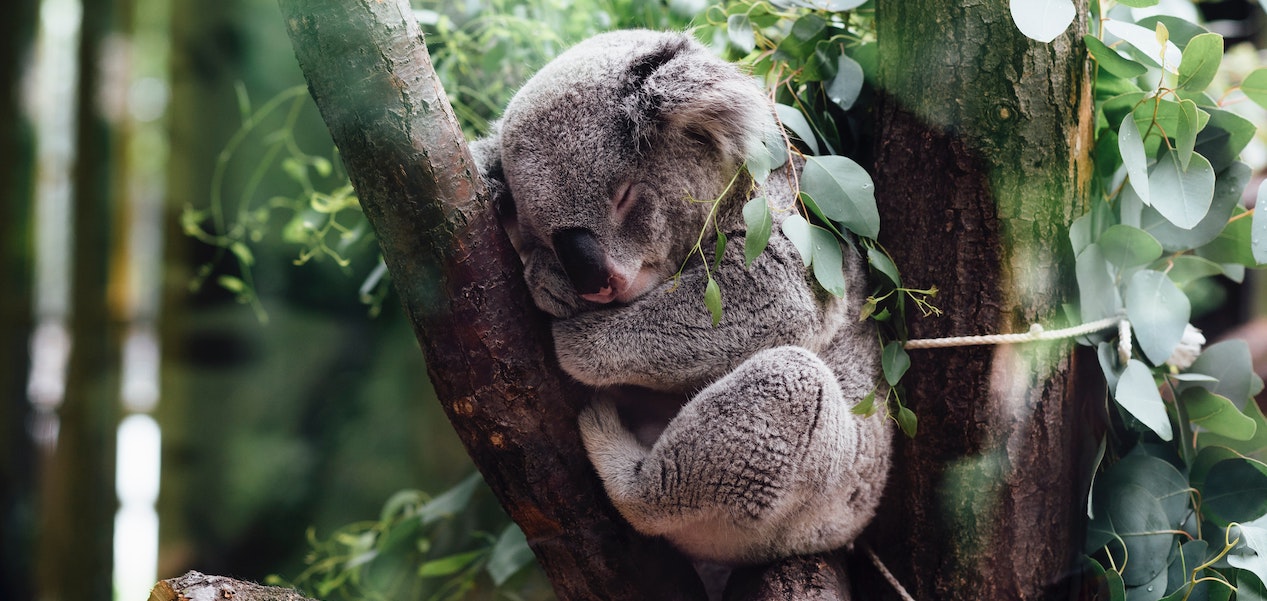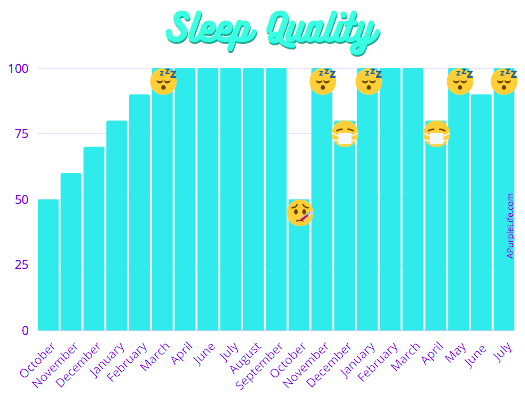So I have always had trouble sleeping. And given that this pattern has continued for over 30 years, I assumed that this was just an unavoidable trait of mine. I’ve always had trouble quieting my racing brain enough to get to sleep and then had trouble staying asleep throughout the night.
At times, this has worked in my favor since the jobs I had in ad agencies, seem to assume you don’t sleep anyway 🙂 . However, this obviously wasn’t healthy for me as a person, and I was constantly tired. I thought that’s just what adulthood felt like – and I’m so happy that I was wrong 🙂 .
I had a few loose goals when I retired in 2020, but one of the biggest ones was seeing if I could sleep better and testing my theory that “this is just how I am.” So I set to testing my theory. Would a lack of work stress and unlimited time improve my sleep or is tiredness just an inevitable state of adulthood?
My Tools
Like any explorer, I stocked up on tools that I thought would help my journey into dreamland. That included physical tools, such as this lovely and affordable eye mask , these slim fit earplugs (for my small ears 🙂 ) and this white noise machine.
I also started using digital tools, such as:
- F.lux: This is free software that I’ve been using for a few years on my personal laptop. It slowly changes the amount of blue light your computer is emitting throughout the day so there’s only warm, orange light coming through your screen at night. My android phone does something similar with its Night Mode Setting
- Darker Pro: This is an app and it’s the first time I’ve purchased something from a mobile app store. I had used the free version for a few years and wanted the extra features. This app turns your mobile screen brightness lower than the settings allow on the phone, and the pro version lets you go even darker. Perfect for not blasting me in the face in the middle of the night when I just want to know the time 🙂
- Dark Theme Setting: This is another Android setting I use and love 🙂 . It basically turns everything in the background of my phone black instead of white, such as the navigation bar and the top of Chrome tabs. Just one more way to keep my phone less bright after the sun sets
- Do Not Disturb Setting: Another thing that used to blast me in the face when I picked up my phone during the night, was the string of notifications coming from (almost always) work. I would read them out of curiosity and before I knew it, my brain was whirring, I couldn’t go back to sleep, and I decided to just start on my job for the day. Lame 🙂 . Since retirement, I’ve had the Do Not Disturb setting on almost always, but I have found it especially helpful at night. Emergency calls and texts from my starred contacts still come through, but nothing else, so I can sleep soundly and deal with whatever is happening in the morning
- White Noise Lite App: I mentioned a white noise machine above. I used it for a year or two while working and also for about a year into retirement, and found it very helpful. Then, All Options Considered mentioned an app they had been using to serve the same purpose while keeping their packing light as nomads, so I had to check it out. And I LOVE IT! I replaced our big white noise machine with this app for the past year or so and have never looked back. It has a variety of sounds you can choose from, but my preference for sleeping is the Box Fan
My Approach
So I had all my tools!
Next I had to define my approach. What would I do differently than before? I had two main goal posts:
Sleep As Much Or As Little As I Want
This is obviously directly related to my retirement. Regardless of how tired I was, when my alarm went off on a Monday morning, I had to start getting ready for work during my career. Well, no longer! If I’m sleepy when I open my eyes in the morning, I close them again and keep sleeping 🙂 .
Surprisingly, this hasn’t led to afternoon sleep ins. Depending on what I got up to the day and night before, I’ve slept until 10am before and I think my retirement record was one slumber until 11am, but it never got out of hand.
And on the flip side, I’ve often found myself getting up EARLIER than when I was working. If I open my eyes at 5am as I did yesterday for example, I don’t feel sleepy anymore and notice that a beautiful sunrise is starting, I get out of bed and go watch the sunrise instead of continuing to sleep. Something similar happens if a bird song I don’t know catches my ear 🙂 .
[I get up at 5am to grab water, come back to bed, grab my phone and walk back out]
Partner: Where are you going?
Me: There are bird calls out there I haven't heard before🐦. I want to identify them. I'll be right back.
Partner:…you're adorable.
Me: How dare you👿! I'm badass. pic.twitter.com/YreZu92z7W— A Purple Life (@APurpleLifeBlog) July 15, 2021
Sleep When I’m Sleepy (aka The Siesta)
I used to never nap because I didn’t have time and because I sucked at it. Some of my colleagues at my last remote job would mention that they had just taken a nap before our call, and I couldn’t comprehend how that was possible. My brain wouldn’t shut off, especially in the middle of the work day, enough for me to take a nap.
However, I guess practice makes perfect 🙂 . When I noticed I was getting sleepy in the afternoons, I started lying down in bed. Sometimes I still wouldn’t be able to sleep, so I would read a little or rest my eyes, but after a bit, I noticed that I was falling asleep every time. I wouldn’t set an alarm unless I had somewhere to be, and found my eyes opening about an hour later while my body felt refreshed.
Since then, I’ve become a Napping Queen. I fully embraced the Mexican Siesta when we were living there this spring, and still find myself taking naps from time to time in the afternoon. And I love them so much 🙂 .
Me: I'll just have a quick nap🥰😴.
[3 hours later…]
Me: pic.twitter.com/v0G61ii6ek— A Purple Life (@APurpleLifeBlog) May 26, 2022
The Results
So how am I sleeping now? I fucking rock at it 🙂 . I mention how my sleep has been every month in my monthly retirement recaps, and as a result, have an idea of how my sleep quality has changed over the (almost) 2 years I haven’t been working. Overall, I fall asleep quickly without thoughts racing through my head and I stay asleep longer.
I have no fear that I will miss my alarm, which seemed to lead to worse sleep quality in my past. Instead, I just lie down, close my eyes, and open them to the next day. I often joke in my monthly updates that I feel like a Minecraft character, but that’s really what my sleep is like now. It feels like magic 🙂 .
However, this wasn’t an instant change. I didn’t quit my job and the next day become an amazing sleeper. Like everything, it took time:
However, as you can see, after 6 months, my sleep reached heights I never could have dreamed of before 🙂 . It turns out, being “bad at sleep” is not a set character trait of mine.
I’ve Identified When Sleep Will Be Challenging
Something else interesting is that this experiment helped me identify patterns of when I do find sleep challenging, now that the overarching reason of having a job is gone. One reason makes sense and one does not 🙂 . At times in the last two years, I’ve had trouble sleeping if I’m sick, have trouble breathing or if I’m in pain, which is completely understandable.
The other reason was if it’s a full moon 🙂 . I have no idea if this is because of some kind of latent lycanthropy or what, but it’s a fairly consistent pattern and I suspect it has little to do with the larger amount of light a full moon puts out since I’m wearing my eye mask. Weird 🙂 . And then of course there are the random one-offs like this:
Me: I'm sleepy and this bed is so comfy! I'm gonna fall right to sleep tonight.
My Brain: Remember that idiotic thing you said in 1997? pic.twitter.com/B8jGLV08cy— A Purple Life (@APurpleLifeBlog) November 11, 2021
I’ve Continued To Improve
So I was originally going to write this post a year ago to recap my first year of sleep in retirement, but life got away from me 🙂 . Luckily since I procrastinated writing this post, I can relay how my sleep has changed from Year 1 to Year 2 in retirement! Let’s just pretend that was my intention all along 😉 .
The first year I was retired, it would take me one or two nights to get used to our new nomad location and start sleeping like a baby. We moved about every month, so every first night I would awaken to the new sounds in the space, and to remember where the hell I was 🙂 . Well, now that I’m approaching 2 years of retirement and nomad life, that’s no longer a problem. I’ve been able to get to a new location, settle in and sleep perfectly from the first night. Improvement!
This gives me hope that with more time, maybe I can kick my full moon sleeping issue in the butt. Though maybe I shouldn’t get into a fight with a celestial body 🙂 . I also doubt I can fix my sleep troubles while I’m sick unless I become Wolverine or something, but I’m open to suggestions if you have them.
We lost power for 12 hours and I slept through all of it⚡😴🤷🏾♀️. Jet lag for the win! 🤣 pic.twitter.com/BxUgy9W8Qf
— A Purple Life (@APurpleLifeBlog) March 8, 2022
Conclusion
So that’s how my sleep has changed after almost 2 years of early retirement. I didn’t know if I would be able to change this supposed trait of mine, but apparently, I’m not a bad sleeper 🙂 . The lack of stress and increased time that I have in retirement has allowed me to further improve myself, and I couldn’t be more grateful.
Next year I think I’ll focus on another vague goal I had in retirement: being one with nature. I have gotten much better at this, but basically I would like to more closely align my sleeping schedule with when the sun has set. It will be interesting to see if I can do this while my partner is still following a more traditional work schedule, but it’s something to work towards. I might be accidentally turning myself into an “early bird” 🙂 . We shall see!
How do you sleep? Do you use any tools to help your sleep?



I sleep without tools but one moment in my life had the crash moment: too tired for too long bad sleeping. That moment the doctor gave me medical leave and he wrote on prescriptions instead of pills: walk daily 1-2 hours, sleep. Modern agitated life put me down….I had an activity tracker for counting steps and sleep patterns and identified like this some bad comportments.
I removed coffee for all and no sugar on evenings -including coloured drinks (it agitates me) . I removed screens before sleep and don’t take anymore mobile with (we don’t have tv). I go in bad same hour or at least I try to ready 22:30 -23:00 as this is my better slot time. I reduced the temp in the bedroom (I sleep better on colder weather) . I did kine exercises for recovery my back and continue stretching since there. I started to write on paper, like old fashion persons, all the tasks I didn’t finish or running in my head to be done next day – writing on paper was like extracting from head and reliefing me mental. I try to have a long walk each evening – I see it improvement. None of these steps did magic, but all had obvious small impacts on me.
Those are all great “prescriptions”! I also love to write down things that pop into my head so I let them go 🙂 .
“latent lycanthropy”…. loved that 🙂 Keep on sleeping!
Glad you liked it – and will do!
Great post! I love the chart.
I retired a year ago and my sleep has likewise improved. Sleeping mask and earplugs are a must for me as well.
On a different note, I recently read your running posts. I’ve downloaded the Just Run app and borrowed Slow Jogging from the library. So far it’s working great. Thank you for the inspiration!
So glad you liked the chart and I’m so happy to hear your sleep has improved in retirement as well 🙂 . And WOOHOO – that’s SO COOL about running. You’ve got this!!
Now that you mention it I do find that I sleep much better on vacation than I do during the work week. Who would have thought having more time and less stress is actually better for our collective health!? Haha oh well, back to work for now.
I envy your push to become a morning person–I’m just not sure I have it in me. My night owl tendencies are too strong!
Haha yeah – who would have thought 😉 ? And yeah my night owl tendencies are also strong, but I think I love more sunlight more. We shall see!
100% track with the sleeping better while on holiday thing. I prefer not waking up to an alarm, but it’s a necessity due to work. I’ve found that if I go to bed early, with plenty of time to sleep before the alarm, then I tend to wake up earlier and well-rested, therefore not needing the alarm. BUT it’s easier said than done to stick to a good bedtime and sometimes social stuff means I’m up later than ideal.
Also agree with the blue light reduction, blocking out light and noise, and calming the mind (I like to read!).
I’ve also noticed that I have cycles of sleepiness and alertness. If I don’t fall asleep within the sleepy cycle (22:00 – 23.30 ish) then I find it really, really difficult to fall asleep for another 1.5 hours and the sleep isn’t as good.
In short: go to bed when sleepy, at roughly the same time, and follow a wind-down routine to rest the mind and block out potential disturbance. Mindblowing stuff, I know.
Our parents knew this when handling us as babies and kids. It seems so weird that we have to rediscover this as adults XD
Yeah it’s definitely easier said than done since the world isn’t all on our schedule 🙂 . That’s interesting about the phases of awake-ness and alertness. I haven’t noticed that in myself, but I’ll pay more attention and see if I can find a pattern! And yeah it’s hilarious what we have to re-learn as adults.
I so wish I could sleep all I need!
I have a question about the ear plugs: do you throw them away after each use? Do you wash them after every use? I have a very light sleep and I might start using them, but I’m not sure about the maintenance 😜
Thanks and ciao from Italy!
I throw them out after they get dirty, which takes a few uses over about a year because I use them so rarely. Ciao!!
Glad you’re sleeping a lot better! It’s definitely not right if you’re getting terrible sleep every night.
Not a fan of how people often assume that it’s normal to get inadequate sleep. Great job of letting the world know that there’s a better way!
Yeah I’m not a fan of it either and thank you!
I don’t have insomnia and I sleep quite well, but I do think that some jobs/workplace environments can impact a person’s sleep in a negative way.
I don’t use any tools to help me sleep but I’m been trying to improve my sleep hygiene by going to bed at a reasonable time and weaning myself of devices before I go to bed. Also, something that helps me is playing mellow music to help me fall asleep, but I normally fall asleep quite quickly as soon as my head hits the pillow.
Also, I find that certain factors can impact my sleep (e.g. trauma, illness, mental health struggles, lack of work-life balance, extreme stress, etc) so if I’m not getting good/enough sleep, I try to evaluate what’s going on in my life, get to the root cause and resolve those issues.
Chichi Ogwe
https://chichiwrites.com/
I’m happy to hear you sleep well! Also you have a wonderful approach to sleep and changing parts of your life if it’s getting in the way of that goal. Brava!